TO
| Creator | Title | Description | Subject | Date | ||
|---|---|---|---|---|---|---|
| 1 |
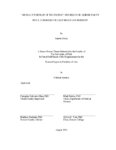 |
Doxey, Lauren | "An exact portrait of the people": the need for Gender Parity in U.S. congress for legitimate government | Though women received the right to vote in 1919 with the ratification of the nineteenth amendment, women still hold few elected positions. In the United States Congress, women make up 19.4% of the body. When groups are not represented fully, this affects the quality of the representation they recei... | Women legislators; United States; attitudes | 2016-08 |
| 2 |
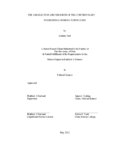 |
Burt, Zachary | The 1968 election and the birth of the contemporary presidential nomination process | The 1968 election was a landmark election in American political history. In the summer of 1968, Vice President Hubert Humphrey was nominated by the Democratic Party. This nomination was controversial, and the Democrats' summer convention was chaotic and infamous. Humphrey gained the nomination due t... | Democratic national convention - 1968 | 2012-05 |
| 3 |
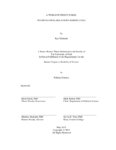 |
Palomaki, Kya | A world without nukes: International relations perspectives | What if nuclear weapons had been neither invented nor discovered? This is the question I take into consideration in this paper. This interesting scenario begs the answer parroted by bloggers and students of politics alike-without nuclear weapons, there would be nothing to stop belligerents from inva... | Security, International; International relations; Nuclear weapons; World politics -- 21st century | 2015-05 |
| 4 |
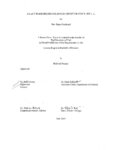 |
Seastrand-Bachynski, Sara Jayne | An act to decrease childhood obesity rates in the U.S. | The Healthy Hunger-Free Kids Act of 2010 was signed into law in order to address alarming childhood obesity rates in the U.S. In this paper, I address the importance of the Healthy Hunger-Free Kids Act of 2010 and how it enhances child health by improving the food environment for children in public ... | Childhood obesity; Utah | 2014-05 |
| 5 |
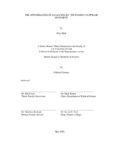 |
Shah, Diya | The appropriation of Sacajawea by the women's suffrage movement | This project examines why Sacajawea was an attractive figure to be resurrected and appropriated during the U.S. suffrage movement, especially in the 1890s to 1920s. To understand the construction and use of Sacajawea, I analyzed about 25 newspaper articles published about Sacajawea in the 1900s and ... | Sacagawea Women; political activity; United States; Women; suffrage; United States | 2015-05 |
| 6 |
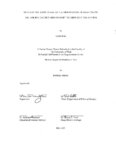 |
Ruiz, Loren | Beneath the dark cloak of U.S. deportation: Bureaucratic distancing tactics employed by the deportation system | U.S. deportation policy is implemented behind a dark cloak of secrecy. Distancing tactics are employed throughout the deportation process to prevent those participating within the bureaucracy from feeling empathy for those they process. Pachirat (2011) provides a three-part template of analysis for ... | Deportation -- United States | 2015-05 |
| 7 |
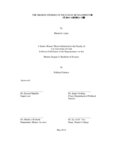 |
Lopez, Mauricio | The broken promise of inclusive development: the case of Peru | In recent years, Peru has been one of the fastest growing economies in the world, outpacing emerging giants of the developing world such as Brazil and Russia. From 2003 to 2011 Peru's GDP per capita almost tripled. Nevertheless, currently almost one third of the Peruvian population still lives in po... | Peru - Economic conditions - Regional disparities; Inclusive development | 2013-05 |
| 8 |
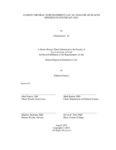 |
Tu, Christianna L. | Closing the health development gap: An analysis of health spending in Southeast Asia | Financing health development through increased domestic resource allocation is a topic of substantial discussion for the post-2015 development agenda. Past development strategies, including the Millennium Development Goals (MDGs), have relied on wealthy country aid commitments in order to fund inter... | Medical care - Southeast Asia - Finance | 2015-08 |
| 9 |
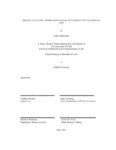 |
Sibbernsen, Colin | Digital activism: Addressing social movements in the digital age | Technological progression in the area of information and communication technology allows for expansion of prior social movement theorizing. The ways in which social movements are organized and carried out today need to be carefully analyzed and discussed to identify new methods of organization and m... | Technology - Sociological aspects | 2012-05 |
| 10 |
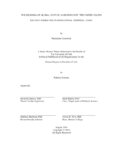 |
Comstock, Mackenzie | The Dilemma of Global Justice: Assessing Why the United States Has Not Joined the International Criminal Court | The United States has long been called the policeman of the world, intervening in international conflicts in order to promote peace and security on a global scale. With such a history, why then, has the United States not joined the International Criminal Court? A key actor in the establishment of... | International criminal courts - United States | 2016 |
| 11 |
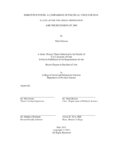 |
McInnis, Tillie | Disruptive power: A comparison of political voice for non-elites after the great depression and the recession of 2008 | This thesis investigates how non-elites influence policymaking in a time of large income and wealth inequality. To do this, I examine the tactics of disruptive power used by two groups following two major economic downturns in the U.S.: the industrial workers after the Great Depression in the 1930s ... | Power (Social sciences); Elite (Social sciences) | 2015-05 |
| 12 |
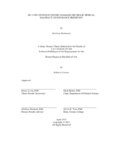 |
Mortensen, Matthew | Do caps on non-economic damages decrease medical malpractice insurance premiums? | This paper examines whether tort reform, like caps on non-economic damages for medical malpractice claims, actually lower insurance premiums for physicians. Proponents of tort reform argue that large jury awards against physicians have driven up physician insurance premiums, and as a result, overall... | Physicians' malpractice insurance - United States; Insurance premiums - United States | 2015-04 |
| 13 |
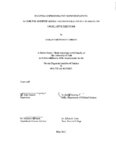 |
Gordon, Oakley Benedict | Electing representative representatives: a case for modified single transferable voting in American legislative elections | American government is founded upon the principle that its rulers should represent and be elected by its citizenry. To this end, America and its states elect large deliberative bodies charged with representing the people within their jurisdictions. The architects of federal and state governments, ho... | American government; Voting - United States | 2012-05 |
| 14 |
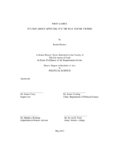 |
Barnes, Rachel | First ladies: It's not about aptitude; it's the way you're viewed | While Presidential popularity is frequently researched and discussed, the same attention has not been paid to the study of the First Ladies and their popularity. With the constantly changing role of femininity in American society, the First Lady has become an increasingly important and visible figur... | Presidents' spouses - United States - Public opinion; Public opinion - United States - History | 2013-05 |
| 15 |
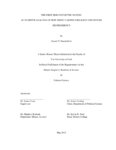 |
Shackelford, Daniel T. | The first servant of the nation : an in-depth analysis of how Jimmy Carter's religion influenced his presidency | Mitt Romney's recent run to become the nation's first Mormon president has made many Americans question what role religion plays in the presidency. While some fervent Romney supporters saw him as man chosen by God for the White House, opponents saw his overt commitment to his religion as a dangerous... | Carter, Jimmy, 1924 - Religion; Christianity and politics - United States - History - 20th century | 2013-05 |
| 16 |
 |
Dean, Courtney | Food Aid or Industry Subsidy? the Power Dynamics of How the U.S. Feeds the World | In the 1950s the United States passed Public Law 480 and officially took up the cause of international food aid. Today, the United States is the largest provider of food assistance in the world accounting for over 50% of all aid. While other counties have stepped back or shifted their commitments t... | Public law - United States - History | 2016-08 |
| 17 |
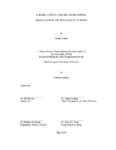 |
Jochim, Jordan | Forging a truce, forcing an encounter: James Baldwin and the paradox of injury | In States of Injury, Wendy Brown argues that emancipatory projects premised upon the "injured identity" of oppressed groups work inadvertently to solidify hierarchical social structures and generates forms of resentment that are ultimately self-defeating. As such, she urges the abandonment of injure... | Baldwin, James, 1924-1987 - Criticism and interpretation; Political science - Philosophy; Power (Social science) | 2014-05 |
| 18 |
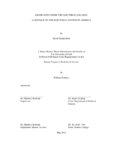 |
Shackelford, David | Graduating from the Electoral College : a critique on the electoral system of America | Our country is founded on democracy and the will of the people, but in the 2000 election the majority of citizens in the United States voted for the losing candidate. This result, of course, only is possible through the system called the Electoral College. This paper traces the history of the Electo... | Electoral college; Presidents - United States - Election | 2013-05 |
| 19 |
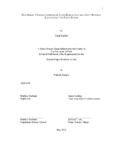 |
Bartlett, Sarah | How minority parties can increase voter mobilization and affect national elections in a two-party system | The American electoral system inhibits minority parties from gaining sufficient power to affect national politics or elections. This claim is proved by U.S. history and the lack of minority parties holding major offices. This paper studies the religious right movement, a minority group in America, t... | Elections - Research - United States; Republican Party (U.S. :1854 - ) - Religion - 21st century; Green Party (U.S); Minorities - Political activity - United States | 2012-05 |
| 20 |
 |
Edgette, Ashley | Individual, collective, and neighborhood political capital : relationships of change, power, and love in Salt Lake City | In this study, I examine how three Latina community leaders from the Riverbrook neighborhood of Salt Lake City enact their political capital. My three measures of political capital are perceptions of individual power, community relationships, and influence in the larger school-community setting. Mot... | Community leadership - Utah - Salt Lake City; Hispanic American mothers - Utah - Salt Lake City | 2013-08 |
| 21 |
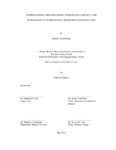 |
Aryaeinejad, Kateira | International organizations, intrastate conflict, and humanitarian intervention: Determinants of success | The objective of this research project is to determine which specific organizational structures and characteristics increase the likelihood that a humanitarian intervention will occur and result in success. With that goal in mind, I develop two main hypotheses which I then test against carefully cho... | Humanitarian intervention; Security, International | 2013-05 |
| 22 |
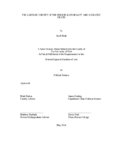 |
Rush, Jacob | The Kantian concept of the person, rationality and Socrates' death | In this paper, I consider Socrates' death sentence in The Apology and his choice to accept his death sentence in The Crito. I structure his choice in a Kantian manner. First, I argue that Socrates has a duty to himself, as a rational agent, to (a) act as a promisekeeping individual and (b) perform t... | Socrates - Death and burial; Kant, Immanuel, 1724-1824 - Ethics | 2014-05 |
| 23 |
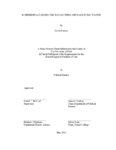 |
Kenney, Devin | Monumental failure: the navajo tribe and radiotoxic wastes | The extraction of uranium has a troubled history in the Navajo Nation, a history born of lack of representation, lack of interest, and ultimately, lack of regard for human life. The United States government failed to carry out their obligation to protect the health and economic well-being of the Nav... | Navajo Tribe - Government relations; Uranium mines and mining - Environmental aspects - United States; Uranium mines and mining - Waste disposal - Navajo Indian Reservation | 2012-05 |
| 24 |
 |
Pistorius, Jordan | The operational code of presidential candidate Hillary Clinton | Operational code analysis provides key insight into the fundamental views that influence the decision making process. In this paper, I explain the importance of operational code in regard to understanding how important leaders think and in forecasting their behavior in future decision making roles... | Clinton, Hillary Rodham; Presidential candidates - United States; Women presidential | 2016-05 |
| 25 |
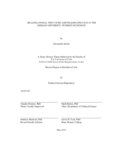 |
Sadler, Alexandria | Organizational structure and framing process in the Chilean University student movement | The 2011-2015 Chilean university student movement for free, public and quality education has brought education to the forefront of Chilean politics. In 2015 students continue to mobilize through student federations at each university, even as the government beings to implement free higher education.... | Student movements - Chile | 2015-05 |
